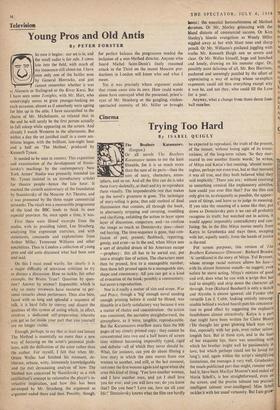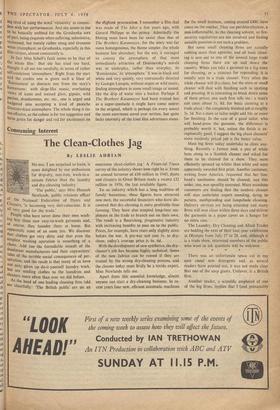Cinema
Trying Too Hard
By ISABEL QUIdLY The Brothers Karamazov. (Empire.) OF all novels The Brothers Karaonazov seems to me the least filmable, for it is so much more than the sum of its parts—than the sum of story, characters, atmo- sphere, and so on. And all the film can do is take these (very skeletally, at that) and try to reproduce them visually. The imponderable rest that makes up the novel's greatness is gone. The technique of story-telling is gone, that odd method of final illumination that consists, all through the book, in alternately stripping and covering, muddling and clarifying, enfolding the action in layer upon layer of discussion, conjecture, and—to confuse the image as much as Dostoievsky does—sheer red herring. The time-sequence is gone, that con- fusion of past, present; flashback, reporting, gossip, and even—as in the end, when Mitya sees a sort of detailed dream of his American escape —prophecy : this all has to be sorted out, put into a straight line of action. The characters must then be pruned, first to a manageable number, then those left pruned again to a manageable size, shape and consistency. All you can get is a kind of evocation of the book; possibly a commentary, but never a reproduction. .
Nor is it really a matter of size and scope. War and Peace, though a `big' enough novel needing enough pruning before it could be filmed, was filmable in a fairly satisfactory way because it was a matter of choice and concentration : the action was consistent, the narrative straightforward, the atmosphere, as it were, tangible, reproduceable. But the Karamazovs overflow more than the 800 pages of my closely printed copy : they cannot be concentrated into two and a half hours of screen time without becoming impossibly typed, rigid and definite—all of which they never should be. What, for instance, can you do about filming a love story in which the man moves from one woman to another, and still, at the last moment, can meet the first woman again and agree when she cries this kind of thing: `You love another woman, and I love another man, and yet I shall love you for ever, and you will love me; do you know that? Do you hear? Love me, love me all your life!' Dostoievsky knows what the film can hardly be expected to reproduce., the truth of the present, of the instant, without losing sight of its transi- toriness, of the long-term values. `So they mur- mured to one another frantic words,' he writes, of Mitya and Katya's last meeting, `almost mean- ingless, perhaps not even true, but at that moment it was all true, and they both believed what they said implicitly.' There you are: without resorting to something comical like explanatory subtitles, how could you ever film that? For the film can only give us, as eloquently as possible, the appear- ance of things, and leave us to judge its meaning. If you take the meaning of a scene like that, put down as Dostoievsky puts it we can all probably recognise its truth; but watched out in action, it would appear impossibly contradictory and con- fusing. So, in the film Mitya moves neatly from Katya to Grushenlca and stays there, escaping with her, equally neatly, from the hands of justice in the end.
For screen purposes, this version of The Brothers Karanzazov (Director : Richard Brooks; `A' certificate) is the story of Mitya. Yul Brynner, whose strange racial mixture allows his face— with its almost feminine mouth—to suggest, even before he starts acting, Mitya's mixture of good and evil, does what he can with a script that has had to simplify and strip down the character all through. Ivan (Richard Basehart) is only a sketch and Alyosha is almost ignored; old Fyodor (the versatile Lee J. Cobb, looking entirely unrecog- nisable behind a wicked beard) puts his concentra- tion to good effect by suggesting the explosive fiendishness almost attractively. Katya is a part that might have been written for Claire Bloom (lie thought her great glowing black eyes very fine, especially with her pale, even rather sallow, longish face. But in those eyes, and in the lines of her exquisite lips, there was something with which his brother might well be passionately in love, but which perhaps could not be loved for long'); and, again within the script's simplifying limitations, she manages it very well. Grushenka, the much-publicised part that might, rumour once had it, have been Marilyn Monroe's and ended UP Maria Schell's, is less straightforward, even on the screen, and the precise (almost too precise), intelligent (almost over-intelligent) Miss Schell tackles it with her usual virtuosity. But I am groW- ialg tired of using the word 'virtuosity' in connec- tion with her performances. And she seems to me to be basically unfitted for the Grushenka sort Of part, being exquisite when suffering, submissive, victimised, but merely rather smug and tiresome When triumphant, as Grushenka, especially in this film version, almost consistently is.
In fact Miss Schell's fault seems to be that of the whole film : that she has tried too hard, thought it all out too carefully, in terms of rather self-conscious 'atmosphere.' Right from the start and the credits one is given such a blast of Russianness' as distracts one from the story's humanness : with dirge-like music, everlasting views of icons and stained glass, gipsies, wild Parties, drunkenness, etc. etc., one is urged and badgered into accepting a kind of pastiche Dostoievskian atmosphere. The whole thing is far too effusive, as-the colour is far too suggestive and turns green for danger and red for excitement on the slightest provocation. I remember a film that was made of The Idiot a few years ago, with Gerard Philippe as the prince. Admittedly the filming must have been far easier than that of The Brothers Karantazov, for the story was far more homogeneous, the theme simpler, the whole business less abundant; but the way it managed to convey the atmosphere of that most immediately attractive of Dostoievsky's novels was to underplay, rather than overplay, its Itussianness,' its 'atmosphere.' It was in black and white and very quietly, very restrainedly directed by Georges Lampin, without orgies or wild music, finding atmosphere in some small image or sound, like the drip of water into a bucket. Perhaps if The Brothers Karamazov had been treated less as a super-spectacle it might have come nearer to the original, which is perhaps (in every sense) the most enormous novel ever written, but quite lacks enormity of the kind film advertisers mean.























































 Previous page
Previous page